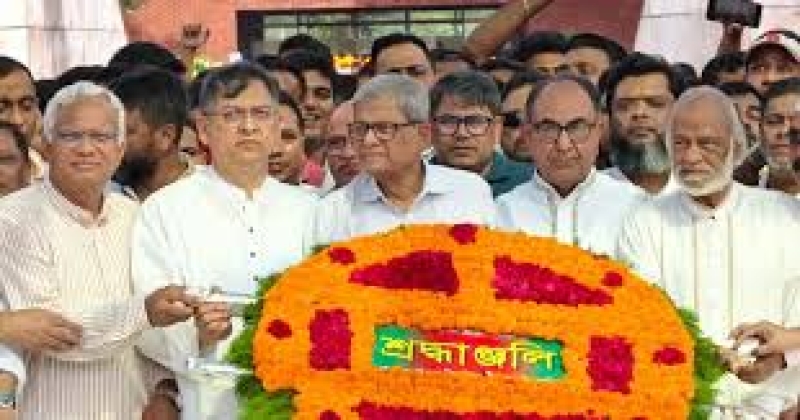- Iran vows to hit all ME economic hubs if US-Israeli attacks persist |
- Sammilito Islami Bank merger to continue: Governor |
- Biman Suspends Flights to Six Middle East Cities Over Tensions |
- Govt Announces 25pc Rail Fare Discount |
- Middle East War Puts Bangladesh Jobs at Risk |
Efforts underway to destroy democracy: Fakhrul

BNP Secretary General Mirza Fakhrul Islam Alamgir on Friday alleged that various efforts are once again underway to destroy democracy in Bangladesh, following last year’s July–August mass uprising.
“After the mass uprisings in Bangladesh, there are now again different kinds of attempts and conspiracies to destroy democracy. At this moment, the Revolution and Solidarity Day inspires us to follow the path through which we can truly build a democratic and prosperous Bangladesh,” he said.
Speaking to reporters after paying homage to BNP founder and former president Ziaur Rahman at his grave, Fakhrul said the “civil-military uprising” of November 7, 1975, also inspires the party to work towards building a country where people’s right to vote and right to justice are guaranteed.
“Along this path, Bangladesh will move forward, BNP will move forward, and we are working towards that goal,” the BNP leader said.
Earlier, Fakhrul, along with thousands of BNP leaders and activists, paid homage to Zia by placing wreaths at his grave in the capital’s Sher-e-Bangla Nagar, marking the National Revolution and Solidarity Day commemorating the “civil-military uprising” of November 7, 1975. They offered fateha at the grave of the party’s founder and prayed for the eternal peace of his departed soul.
Fakhrul described November 7, 1975, as a turning point in Bangladesh’s history when patriotic soldiers and mass people united to foil the conspiracies of hegemonic forces and freed Ziaur Rahman, the “proclaimer of independence,” from captivity, entrusting him with the responsibility of leading the nation.
He said Ziaur Rahman laid the foundation for Bangladesh’s political and economic transformation by restoring multi-party democracy, ensuring press freedom, guaranteeing the independence of the judiciary, and introducing a free-market economy.
During his short term in office, Fakhrul said Zia vigorously reformed the country’s political and economic systems, moved Bangladesh away from one-party BAKSAL rule to a multi-party democracy, opened up the media sector—which previously had only four newspapers—and strengthened judicial independence by establishing the Judicial Council.
He said Zia also set the groundwork for Bangladesh’s economic progress by launching the free-market system, encouraging industrial growth, and creating opportunities for overseas employment—initiatives that laid the foundation for today’s thriving garment industry and remittance-driven economy.
“This was how the journey towards a prosperous Bangladesh began. Ziaur Rahman laid the foundation for building a happy and democratic state,” the BNP leader said.
Fakhrul said Zia, a great leader born once in a generation, established the very basis of Bangladesh’s progress. “That is why this day is not only significant for BNP but also deeply important to all democratic-minded people across the nation.”
BNP is observing the National Revolution and Solidarity Day today with various programmes held with due respect.
On this day in 1975, amid political unrest, soldiers and civilians together freed then Chief of Army Staff Ziaur Rahman from captivity in Dhaka Cantonment, paving the way for him to come to power.
On November 2, BNP announced a 10-day programme to mark the day extensively, aiming to highlight its true historical importance.
As part of the programmes, the party flag was hoisted atop all its offices across the country in the morning.
The BNP’s Dhaka South and North city units brought out a rally from the party’s Nayapaltan central office at 3:00pm. All district and upazila units of the party also held rallies on the same day, reports UNB.

